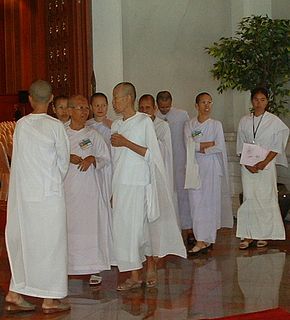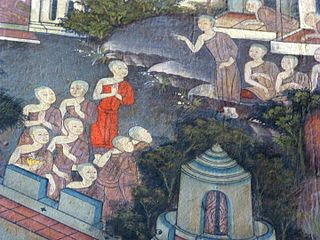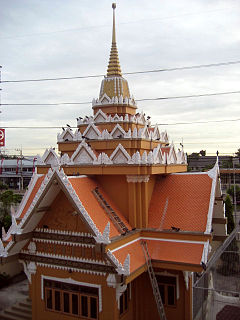Related Research Articles
Theravāda is the most commonly accepted name of Buddhism's oldest existing school. The school's adherents, termed Theravādins, have preserved their version of Gautama Buddha's teaching or Buddha Dhamma in the Pāli Canon for over two millennia.

The ordination of women to ministerial or priestly office is an increasingly common practice among some contemporary major religious groups. It remains a controversial issue in certain Christian traditions and most denominations in which "ordination" was often a traditionally male dominated profession.

A bhikkhu is an ordained male in Buddhist monasticism. Male and female monastics are members of the Sangha.

Saṅghamittā was the eldest daughter of Emperor Ashoka and his first wife, Devi. Together with her brother Mahinda, she entered an order of Buddhist monks. The two siblings later went to Sri Lanka to spread the teachings of Buddha at the request of King Devanampiya Tissa who was a contemporary of Ashoka. Ashoka was initially reluctant to send his daughter on an overseas mission. However, because of the insistence of Sangamitra herself, he finally agreed. She was sent to Sri Lanka together with several other nuns to start the nun-lineage of Bhikkhunis at the request of King Tissa to ordain queen Anulā and other women of Tissa's court at Anuradhapura who desired to be ordained as nuns after Mahindra converted them to Buddhism.

Phra VisuddhisamvaratheraAM, known as Ajahn Brahmavaṃso, or simply Ajahn Brahm, is a British-born Theravada Buddhist monk. Currently, Ajahn Brahm is the abbot of Bodhinyana Monastery in Serpentine, Western Australia; Spiritual Adviser to the Buddhist Society of Victoria; Spiritual Adviser to the Buddhist Society of South Australia; Spiritual Patron of the Buddhist Fellowship in Singapore; Patron of the Brahm Centre in Singapore; Spiritual Adviser to the Anukampa Bhikkhuni Project in the UK; and Spiritual Director of the Buddhist Society of Western Australia (BSWA). He returned to the office on 22 April 2018 after briefly resigning in March, following a contentious vote by members of the BSWA during their annual general meeting.

Theravada Buddhism is the largest and official religion of Sri Lanka, practiced by 70.2% of the population as of 2012.
Ayya is a Pali word, translated as "honourable" or "worthy".

Buddhism in Thailand is largely of the Theravada school, which is followed by 95 percent of the population. Thailand has the second largest Buddhist population in the world, after China, with approximately 64 million Buddhists. Buddhism in Thailand has also become integrated with folk religion as well as Chinese religions from the large Thai Chinese population. Buddhist temples in Thailand are characterized by tall golden stupas, and the Buddhist architecture of Thailand is similar to that in other Southeast Asian countries, particularly Cambodia and Laos, with which Thailand shares cultural and historical heritage. Thai Buddhism also shares many similarities with Sri Lankan Buddhism. Thailand, Cambodia, Myanmar, Sri Lanka and Laos are countries with Theravada Buddhist majorities

Maechi or Mae chee are Buddhist laywomen in Thailand who have dedicated their life to religion, vowing celibacy, living an ascetic life and taking the Eight or Ten Precepts. They occupy a position somewhere between that of an ordinary lay follower and an ordained monastic and similar to that of the sāmaṇerī.

Buddhist monasticism is one of the earliest surviving forms of organized monasticism and one of the fundamental institutions of Buddhism. Monks and nuns, called bhikkhu and bhikkhuni, are responsible for the preservation and dissemination of the Buddha's teaching and the guidance of Buddhist lay people. Three surviving traditions of monastic discipline (Vinaya), govern modern monastic life in different regional traditions: Theravada, Dharmaguptaka, and Mulasarvastivada.
A dasa sil mata is an Eight- or Ten Precepts-holding anagārikā in Buddhism in Sri Lanka, where the newly reestablished bhikkhuni (nun's) lineage is not officially recognized yet.
The Sīladharā Order is a Theravada Buddhist female monastic order established by Ajahn Sumedho at Chithurst Buddhist Monastery, England. Its members are known as Sīladharās.

Women in Buddhism is a topic that can be approached from varied perspectives including those of theology, history, anthropology, and feminism. Topical interests include the theological status of women, the treatment of women in Buddhist societies at home and in public, the history of women in Buddhism, and a comparison of the experiences of women across different forms of Buddhism. As in other religions, the experiences of Buddhist women have varied considerably.

Dhammananda Bhikkhuni, born Chatsumarn Kabilsingh or Chatsumarn Kabilsingh Shatsena, is a Thai bhikkhuni. On 28 February 2003, Kabilsingh received full monastic ordination as a bhikkhuni of the Theravada tradition in Sri Lanka. She is Abbess of Songdhammakalyani Monastery, the only temple in Thailand where there are bhikkhunis.

A thilashin is a female renunciant in Burmese Buddhism; a Burmese Theravada Buddhist nun. They are not fully ordained nuns, as the full ordination is not legal for women in Burma (bhikkhuni), but are closer to sāmaṇerīs, 'novice nuns'. According to 2016 statistics published by the State Sangha Maha Nayaka Committee, there were 60,390 thilashin in Myanmar (Burma).
A bhikkhunī or bhikṣuṇī is a fully ordained female monastic in Buddhism. Male monastics are called bhikkhus. Both bhikkhunis and bhikkhus live by the Vinaya, a set of rules. Until recently, the lineages of female monastics only remained in Mahayana Buddhism and thus are prevalent in countries such as China, Korea, Taiwan and Vietnam but a few women have taken the full monastic vows in the Theravada and Vajrayana schools over the last decade. From conservative perspectives, none of the contemporary bhikkuni ordinations in Thailand or Tibet are valid.

Songdhammakalyani Monastery is a temple and monastery of Bhikkhuni in Nakhon Pathom, Thailand. It was founded in 1960 by Ven. Ta Tao Fa Tzu, the first modern Thai woman to ordain as a bhikkhuni. The monastery was originally known as Wat Songdhammakalyani ."
Voramai Kabilsingh, also known by her monastic name Ta Tao Fa Tzu (Chinese: 大道法師; pinyin: Dàdào Fǎshī, was born Lamai Kabilsingh, was the first modern Thai bhikkhuni. She founded Songdhammakalyani Monastery, the first modern monastery in Thailand for bhikkhuni and was the mother of Dhammananda Bhikkhuni, the current abbess of Songdhammakalyani Monastery.
Varangghana Vanavichayen is the first woman to be ordained a Theravada bhikkhuni in Thailand. She was ordained a novice bhikkhuni on 10 February 2002 in Songdhammakalyani Monastery. The ceremony was attended by eight female monks from Sri Lanka, Taiwan, Thailand and Indonesia. It was conducted in Sri Lankan tradition. Upon the ordination she adopted the name of Dhammarakhita Samaneri. The Abbess of the nunnery was Dhammananda Bhikkhuni, who is also the first Theravada bhikkhuni in Thailand.
This is a timeline of notable moments in the history of women's ordination in the world's religious traditions. It is not an exhaustive list of all historic or contemporary ordinations of women.
References
- 1 2 3 "Nation's First Female Buddhist Monk Ordained". LA Times. Retrieved 3 November 2016.
- ↑ Turner, Darrell. "Religion: Year In Review 2002". Encyclopædia Britannica. Encyclopædia Britannica. Retrieved 3 November 2016.
- 1 2 3 Sivasomboon, Busaba. "First female monk ordained in Thailand, challenging country's all-male Buddhist clergy". The Lubbock Avalanche-Journal. AP. Retrieved 3 November 2016.